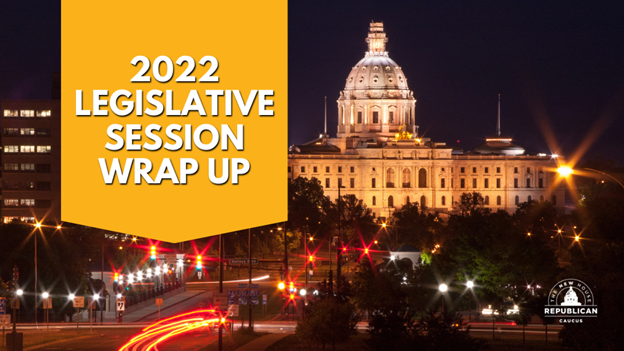The 2022 legislative session of the Minnesota Legislature ended on May 23rd. When we started this year’s session back in the end of January, there was a lot of discussion about what, if anything, would be accomplished. Now, with session in the rear-view mirror, I want to let you know about what was accomplished, what didn’t happen, and what disasters were avoided.

State Budgeting
Back in 2021, both the Minnesota Legislature and Governor Tim Walz approved a $51.7 billion two-year budget that fully funded state government through June of 2023. As a result, budgeting was not a major priority for the 2022 legislative session. Instead, state legislators were supposed to focus on policy issues that impact the lives of Minnesotans. I worked to bring forward important issues like Voter ID and election integrity.
Nevertheless, spend-happy politicians could not resist the temptation of using your tax dollars even when there was no reason to do so. The Democrat majority in the Minnesota House of Representatives passed over $7 billion in new spending that was totally unnecessary. This would have raised our two-year state budget to over $59 billion.
To put that amount into perspective, $59 billion would be a full 25% increase in state spending from our 2020-21 two-year state budget. That is outrageous! Fortunately, the Republican majority in the Minnesota Senate blocked this spending from being authorized.
Major Legislation
While the House Democrats did not get their spending spree passed into law, there were major pieces of legislation that did become law.
First, the Minnesota Legislature passed, and Governor Walz signed, a bill to replenish the unemployment insurance trust fund. As many of you know, our state’s unemployment insurance fund was decimated when Governor Walz unilaterally shut down our economy in 2020. For months on end, Governor Walz told people to stay home, not work, and sign up for unemployment insurance.
Predictably, our unemployment insurance fund was drained and unemployment taxes on employers were scheduled to go up in 2022 to make up for the lost funds. To avoid this outcome, state government approved legislation that would use $2.7 billion of mostly federal funds to refill the unemployment insurance fund and pay off a federal loan.
Additionally, state government approved one-time bonus payments for frontline workers. This legislation allocated $500 million from the surplus and designated it for workers who could not work from home during the pandemic.
Individuals who worked in health care, social services, emergency response, childcare, schools, food service, retail, and many other sectors were included in this legislation. An estimated 667,000 citizens in Minnesota will be eligible for these one-time payments of $750. To qualify, individuals must meet certain income and employment requirements.
To learn more about the frontline worker payment program and view the application process, please click here.
Spending the Surplus?
At one point during the 2022 legislative session, Minnesota had a projected budget surplus of $9.2 billion: a state record. When you added that surplus to our state’s rainy-day-fund and various cash reserve accounts, Minnesota was swimming in money to the tune of nearly $12 billion.
Of course, state government should not be holding onto $12 billion of taxpayer money that it does not need. As such, I authored major tax reform legislation that would have returned all this money to the people via sweeping tax cuts. Ultimately, I believe this is the people’s money, and it must be returned to you where it belongs. However, the Triumvirate of Governor Walz, the Speaker of the House, and the Senate Majority Leader were not interested in returning this money to the people.
At the end of session, the Triumvirate agreed to a massive multi-billion-dollar deal that would have spent $4 billion, dedicated another $4 billion to a tax bill (which would have included some tax cuts and some spending), and leave another $4 billion in state accounts for future need.
Frankly, this deal was nothing but a bad joke that was cooked up by politicians who want to look busy and feel good about themselves. In my view, the government has no business spending this money or holding on to this money. State government has grown rich at the expense of working people, and the record government surpluses show that. Every dime of our surplus money should have been returned to Minnesota families to help ease the burdens of our unprecedented economic situation.
In the end, the multi-billion-dollar spending deal fell through and was not passed before session ended on May 23rd. While I am happy that the government was prevented from spending billions of more dollars, I am shocked and frustrated by the Minnesota Legislature’s inability to rightfully return tax dollars to the hardworking people who are the beating heart of our state.
For more information about the 2022 legislative session, please click here.
What’s Next?
Currently, Minnesota still has billions of dollars in unspent surplus funds, and many politicians are still clamoring for a special session to spend this money. As you can imagine, I am not in favor of a special session at all. If a special session is called, I fear that it would only result in more of your hard-earned tax dollars being misused. If no special session is called this year, then the fight over what to do with the surplus money will be up to the voters in November. The people will decide whether they want tax-cutting Republicans or Democrats that spend more money.
As it stands now, the Minnesota Legislature is adjourned until January of 2023. Serving as your state representative throughout this session has been an honor and a privilege. Thank you for the trust you have placed in me. As always, my singular goal has been to represent our district well and fight for the people of our communities.
Steve Drazkowski